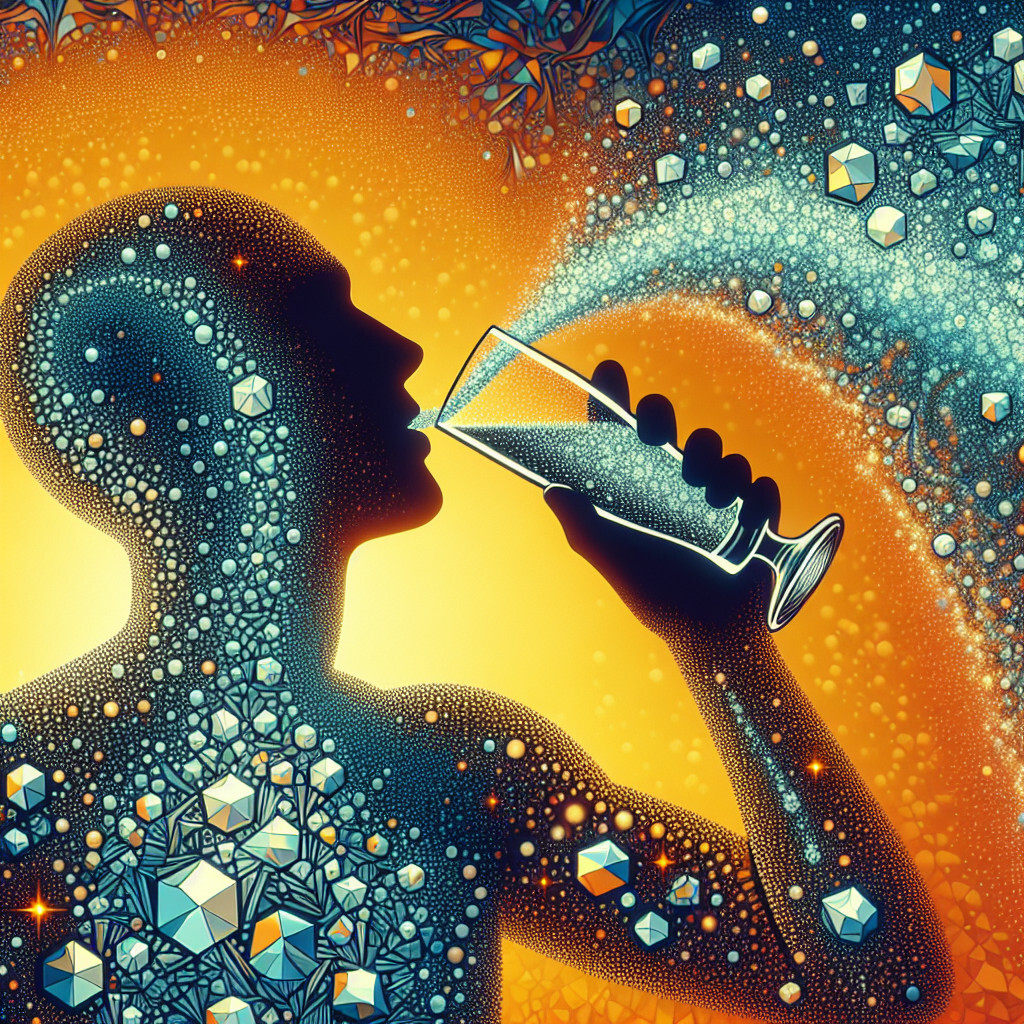-
Table of Contents
- Introduction
- Understanding the Role of Mineral Water in Preventing Kidney Stones
- Can Drinking Mineral Water Really Reduce the Risk of Kidney Stones?
- The Science Behind Mineral Water and Kidney Stone Prevention
- Mineral Water: A Natural Remedy for Kidney Stones?
- Exploring the Health Benefits of Mineral Water: Focus on Kidney Stones
- Q&A
- Conclusion
“Mineral Water: A Simple Sip Towards Kidney Stone Prevention.”
Introduction
Drinking mineral water has been associated with a reduced risk of kidney stones. Kidney stones are hard deposits made of minerals and salts that form inside your kidneys. Staying hydrated is crucial in preventing kidney stones, and mineral water can contribute to this. It not only provides hydration but also supplies the body with essential minerals. Some types of mineral water are high in magnesium and calcium, which can help decrease the risk of forming kidney stones by reducing the concentration of oxalate, a compound that contributes to stone formation. However, it’s important to note that while mineral water can aid in prevention, it’s not a guaranteed cure or sole preventative measure for kidney stones.
Understanding the Role of Mineral Water in Preventing Kidney Stones

Kidney stones are a common health issue that affects millions of people worldwide. These hard deposits, made of minerals and salts, form inside your kidneys and can cause severe pain when they pass through the urinary tract. While there are several factors that contribute to the formation of kidney stones, one of the most significant is dehydration. This is where the role of mineral water comes into play.
Mineral water is a type of bottled water that contains minerals and other dissolved substances that can have therapeutic value. It is often sourced from a mineral spring or well, and its composition can vary widely depending on its source. Some types of mineral water are high in calcium, magnesium, and potassium, minerals that are essential for the proper functioning of the body.
Research has shown that drinking mineral water can help prevent the formation of kidney stones in several ways. Firstly, staying well-hydrated is crucial in preventing kidney stones. When you’re dehydrated, your urine becomes more concentrated with the substances that can form stones. Drinking plenty of fluids, including mineral water, helps dilute these substances and increases the volume of urine, which can help flush them out of the body.
Secondly, some types of mineral water are rich in magnesium and calcium. These minerals can bind to oxalates, compounds that are a common component of kidney stones, in the digestive tract. This binding process prevents the oxalates from being absorbed into the body and forming stones in the kidneys.
Moreover, mineral water that is high in citrate can also help prevent kidney stones. Citrate is a compound that inhibits the formation of calcium stones, the most common type of kidney stone. Drinking mineral water that is high in citrate can increase the levels of this compound in the urine, thereby reducing the risk of stone formation.
However, it’s important to note that not all mineral waters are created equal. Some may contain high levels of sodium, which can increase the risk of kidney stones in some people. Therefore, it’s crucial to read the label and choose a mineral water that is low in sodium but high in beneficial minerals like calcium, magnesium, and potassium.
In conclusion, drinking mineral water can indeed reduce the risk of kidney stones, but it’s not a magic bullet. It’s just one part of a comprehensive approach to preventing kidney stones that should also include a balanced diet, regular exercise, and avoiding excessive intake of sodium and animal protein.
Remember, if you have a history of kidney stones or are at high risk, it’s always a good idea to discuss your diet and hydration habits with your healthcare provider. They can provide personalized advice based on your specific needs and risk factors. So, while mineral water can be a helpful tool in your kidney stone prevention toolkit, it’s not a substitute for professional medical advice.
In the end, the key to preventing kidney stones is maintaining a healthy lifestyle, staying well-hydrated, and making smart dietary choices. And in this endeavor, mineral water can certainly play a beneficial role.
Can Drinking Mineral Water Really Reduce the Risk of Kidney Stones?
Kidney stones are a common health issue that affects millions of people worldwide. These hard deposits, made of minerals and salts, form inside your kidneys and can cause severe pain when they pass through the urinary tract. While there are several factors that contribute to the formation of kidney stones, one of the most significant is dehydration. This is where the role of mineral water comes into play.
Mineral water is a type of bottled water that contains minerals and other dissolved substances that can have therapeutic value. It is often sourced from a mineral spring or well, and its composition can vary greatly depending on its source. Some types of mineral water are high in calcium, magnesium, and potassium, minerals that are essential for maintaining good health.
The question that arises is, can drinking mineral water really reduce the risk of kidney stones? The answer is yes, but with a caveat. Drinking plenty of fluids is crucial in preventing kidney stones, and mineral water can certainly contribute to your daily fluid intake. However, it’s not just about the quantity of water you drink, but also the quality.
Research has shown that drinking water that is rich in certain minerals can help prevent kidney stones. For instance, a study published in the American Journal of Epidemiology found that men who drank the most fluid, particularly water, had a significantly lower risk of developing kidney stones. Moreover, the study found that the type of water consumed also played a role. Men who drank water high in calcium and magnesium had a lower risk of kidney stones than those who drank other types of water.
This is because calcium and magnesium can bind with oxalates in the body, which are compounds that contribute to the formation of kidney stones. When calcium and magnesium bind with oxalates, they form crystals that are excreted in the urine, reducing the risk of these compounds forming stones in the kidneys.
However, it’s important to note that while mineral water can help reduce the risk of kidney stones, it’s not a cure-all. Other factors, such as diet and lifestyle, also play a significant role in kidney stone formation. Consuming a diet high in sodium, for example, can increase your risk of kidney stones by causing more calcium to be excreted in the urine. Similarly, a sedentary lifestyle can also increase your risk.
In conclusion, while drinking mineral water can contribute to reducing the risk of kidney stones, it should be part of a broader strategy that includes a healthy diet and regular exercise. It’s also important to remember that not all mineral waters are created equal. Some are high in sodium, which can increase your risk of kidney stones. Therefore, it’s essential to choose a mineral water that is low in sodium and high in calcium and magnesium.
Remember, prevention is always better than cure. So, stay hydrated, maintain a balanced diet, and lead an active lifestyle to keep kidney stones at bay. And if you choose to include mineral water in your daily routine, make sure it’s the right kind.
The Science Behind Mineral Water and Kidney Stone Prevention
Kidney stones, a common health issue affecting millions of people worldwide, are hard deposits made of minerals and salts that form inside your kidneys. They can cause severe pain and discomfort, and in some cases, may require surgical intervention. However, recent studies suggest that drinking mineral water could potentially reduce the risk of kidney stones.
Mineral water is a type of bottled water that contains various minerals like calcium, magnesium, and potassium. These minerals are not only essential for our overall health but also play a significant role in preventing kidney stones. The science behind this lies in the unique properties of these minerals and how they interact with our body.
Calcium, for instance, is a mineral that is often associated with kidney stones. However, contrary to popular belief, a lack of calcium in your diet can actually increase your chances of developing stones. This is because dietary calcium binds with oxalate in the gut, preventing it from being absorbed into your bloodstream and subsequently excreted into your urine. Without enough calcium, oxalate levels can rise, leading to the formation of calcium oxalate stones, the most common type of kidney stone.
Mineral water, being a rich source of dietary calcium, can help maintain the balance of calcium and oxalate in your body. A study published in the American Journal of Clinical Nutrition found that drinking mineral water high in calcium and magnesium significantly reduced oxalate levels in people prone to kidney stones.
Magnesium is another mineral found in mineral water that can help prevent kidney stones. It plays a crucial role in the body by helping to absorb and assimilate calcium. If you don’t have enough magnesium to help with this process, excess calcium can combine with oxalate to form stones. By drinking mineral water rich in magnesium, you can ensure that calcium is properly absorbed and used by your body, reducing the risk of stone formation.
Potassium, also present in mineral water, is beneficial for kidney health. It helps to neutralize the acids in urine, reducing the risk of stone formation. A study published in the Journal of Urology found that a diet rich in potassium was associated with a lower risk of developing kidney stones.
While the science behind mineral water and kidney stone prevention is promising, it’s important to note that drinking mineral water alone may not be enough to prevent kidney stones. A balanced diet, regular exercise, and staying well-hydrated are also crucial. Moreover, if you have a history of kidney stones or other kidney-related issues, it’s always best to consult with a healthcare professional before making any significant changes to your diet or lifestyle.
In conclusion, mineral water, with its rich content of calcium, magnesium, and potassium, can play a significant role in reducing the risk of kidney stones. It’s a simple, natural, and refreshing way to support your kidney health. However, it should be part of a comprehensive approach to health that includes a balanced diet, regular physical activity, and adequate hydration. So, the next time you reach for a drink, consider choosing mineral water. It’s not just a thirst quencher; it’s a step towards better kidney health.
Mineral Water: A Natural Remedy for Kidney Stones?
Kidney stones, a common health issue affecting millions of people worldwide, are hard deposits of minerals and salts that form inside your kidneys. They can cause severe pain and discomfort, and in some cases, may require surgical intervention. However, recent studies suggest that drinking mineral water could potentially reduce the risk of kidney stones, offering a natural remedy for this painful condition.
Mineral water, as the name suggests, is rich in various minerals like calcium, magnesium, and potassium. These minerals are essential for the body’s overall health and well-being. But how exactly does mineral water contribute to preventing kidney stones? The answer lies in the unique composition of this natural beverage.
Kidney stones primarily form when there’s a high concentration of certain substances in the urine, such as calcium and oxalate. When these substances become too concentrated, they can crystallize and clump together, forming stones. Interestingly, the calcium present in mineral water can help reduce the risk of kidney stones. This might seem counterintuitive, as kidney stones often consist of calcium. However, the calcium in mineral water can bind with oxalate in the digestive tract, preventing it from being absorbed into the body and excreted in the urine. This reduces the likelihood of stone formation.
Moreover, mineral water is often high in magnesium, another mineral that plays a crucial role in preventing kidney stones. Magnesium helps inhibit the formation of crystals that can develop into kidney stones by binding with oxalate, forming a compound that the body can easily excrete.
In addition to calcium and magnesium, mineral water also contains bicarbonate, which can help decrease kidney stone risk. Bicarbonate can help neutralize the acidity in the urine, creating an environment that is less conducive to the formation of kidney stones.
While the potential benefits of mineral water are promising, it’s important to note that drinking mineral water alone is not a guaranteed solution for preventing kidney stones. It should be part of a broader approach to kidney health that includes a balanced diet, regular exercise, and staying well-hydrated. It’s also crucial to remember that not all mineral waters are created equal. The mineral content can vary significantly from one brand to another, so it’s essential to choose a mineral water that contains the right balance of minerals.
Furthermore, individuals with certain health conditions, such as those with kidney disease or those who are at risk for high calcium levels, should consult with a healthcare provider before increasing their intake of mineral water. While mineral water can offer health benefits, it’s important to ensure that it’s consumed in a way that supports overall health.
In conclusion, while more research is needed to fully understand the relationship between mineral water and kidney stones, current studies suggest that drinking mineral water could potentially reduce the risk of kidney stones. Its rich mineral content, particularly calcium, magnesium, and bicarbonate, can help prevent the formation of these painful deposits. However, it’s important to remember that drinking mineral water should be part of a comprehensive approach to kidney health, and it’s always wise to consult with a healthcare provider before making significant changes to your diet or hydration habits.
Exploring the Health Benefits of Mineral Water: Focus on Kidney Stones
Mineral water, a refreshing beverage that is often associated with luxury and wellness, has been gaining popularity for its potential health benefits. One of the most intriguing claims is that drinking mineral water can reduce the risk of kidney stones. This article will delve into the scientific evidence behind this claim and explore the potential health benefits of mineral water, with a particular focus on kidney stones.
Kidney stones are hard deposits made of minerals and salts that form inside your kidneys. They can cause severe pain and are often a result of dehydration, certain diets, or genetic factors. The idea that mineral water could help prevent kidney stones is based on its high mineral content, including calcium and magnesium, which are known to play a role in kidney health.
The primary reason why mineral water may help prevent kidney stones is its high water content. Staying hydrated is one of the most effective ways to prevent kidney stones. When you’re well-hydrated, your urine is more diluted, which prevents minerals and salts from clumping together and forming stones. Drinking mineral water, therefore, can contribute to your daily fluid intake and help keep you hydrated.
Moreover, mineral water is often high in magnesium, a mineral that has been shown to reduce the risk of forming kidney stones. Magnesium can bind with oxalate, a substance that is often involved in the formation of kidney stones, to form a compound that can be easily excreted in the urine. By increasing your intake of magnesium through drinking mineral water, you may be able to reduce your risk of kidney stones.
Calcium is another mineral commonly found in mineral water that may have a protective effect against kidney stones. While it may seem counterintuitive, given that calcium stones are the most common type of kidney stones, dietary calcium actually helps reduce the risk of this condition. This is because dietary calcium can bind with oxalate in the gut, preventing it from being absorbed into the body and excreted in the urine, where it can form stones.
However, it’s important to note that while mineral water can contribute to your overall hydration and mineral intake, it should not be relied upon as the sole preventive measure against kidney stones. A balanced diet low in sodium and rich in fruits and vegetables, regular exercise, and limiting intake of animal protein can also help reduce the risk of kidney stones.
Furthermore, not all mineral waters are created equal. The mineral content can vary greatly depending on the source of the water. Therefore, it’s important to check the label to ensure that the mineral water you choose is high in the beneficial minerals like calcium and magnesium.
In conclusion, while more research is needed to definitively establish the link between drinking mineral water and a reduced risk of kidney stones, the high water and beneficial mineral content of this beverage suggest that it could play a role in kidney health. As part of a balanced lifestyle and diet, drinking mineral water could potentially contribute to the prevention of kidney stones. However, it’s always important to consult with a healthcare professional before making any significant changes to your diet or lifestyle.
Q&A
1. Question: Can drinking mineral water reduce the risk of kidney stones?
Answer: Yes, drinking mineral water can help reduce the risk of kidney stones as it helps in diluting the concentration of minerals in the body that can form stones.
2. Question: How does mineral water help in preventing kidney stones?
Answer: Mineral water contains certain minerals like magnesium and calcium, which can prevent the formation of crystals that lead to kidney stones. It also helps in maintaining the body’s hydration, which is crucial in preventing kidney stones.
3. Question: Is there a specific amount of mineral water one should drink to prevent kidney stones?
Answer: While there’s no specific amount, it’s generally recommended to drink at least eight glasses of fluids, preferably water, a day to maintain proper hydration and reduce the risk of kidney stones.
4. Question: Can all types of mineral water help in reducing the risk of kidney stones?
Answer: Not all types of mineral water are the same. Some may contain higher levels of calcium or other minerals. It’s best to choose a type of mineral water that has a balanced mineral content.
5. Question: Can drinking mineral water alone prevent kidney stones?
Answer: While drinking mineral water can help, it’s also important to maintain a balanced diet and lifestyle. Limiting intake of sodium and animal protein, maintaining a healthy weight, and consuming enough calcium can also help prevent kidney stones.
Conclusion
Drinking mineral water can potentially reduce the risk of kidney stones as it aids in diluting the concentration of minerals in the body that may form stones. However, the type of minerals present in the water can also play a role, as some minerals might contribute to stone formation. Therefore, while mineral water can be beneficial, it should not be solely relied upon for kidney stone prevention.







